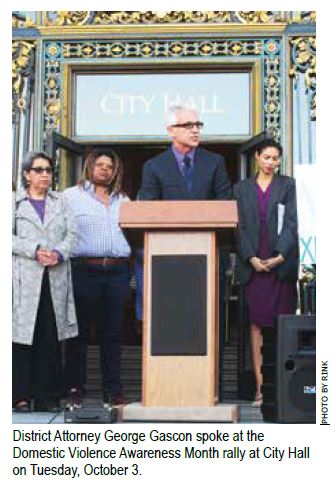October is Domestic Violence Awareness Month. Started in the early 1980s, advocates sought to bring the stigmatized and largely dismissed matters of spousal abuse out from behind closed doors and into the public square.
Today, out of the shadows and out of the closet, the matter of domestic violence has evolved from being considered a private marital issue—in which it was no one’s business to intervene or report abuse to authorities—into a widely understood matter of public health concern and interest. Domestic violence is no longer, and has never been, singularly a women’s issue. While we are all in one way or another effected by domestic violence, the facts reveal that intimate partner violence against women remains prevalent.
The following are key statistics according to national organizations, such as Futures Without Violence:
As a longtime member on San Francisco’s Commission on the Status of Women, I have the privilege to work alongside other dedicated advocates to address domestic violence. The Commission and its Department on the Status of Women allocate nearly $7 million of Violence Against Women grants to diverse local community-based agencies that work daily to provide resources, support services, shelter, and policy guidance that have developed into a national model of collaboration with city agencies, elected and appointed officials, and community leaders.
This intensive, dedicated collaborative effort to heighten public awareness about the signs of domestic violence, promote best practices for intervention, and unify critical response actually resulted in a record 40 consecutive months of zero domestic violence related homicides in the City. The message remains clear: San Francisco does not tolerate domestic or intimate partner violence.

Same-Sex Partners and Domestic Violence
Domestic or intimate partner violence occurs in all racial and ethnic communities, in all socioeconomic strata, and among LGBTQ people.
For same sex couples, research from The Williams Institute, the Center for American Progress, and other sources indicate that domestic violence among same-sex couples occurs at similar rates to that among straight couples. One out of four to one out of three same-sex relationships has experienced domestic violence. Comparatively, one in every four heterosexual women experiences domestic violence in her lifetime.
Historically, prominent differences have existed between the ways in which domestic violence plays out in same sex relationships. These have largely been reflective of the isolation and marginalization of being LGBT, and because we have lacked legal recognition and social validation of our relationships. Problems have included abusers threatening to out partners to co-workers, family and friends; reluctance of victims to report to authorities; and threats to remove children from the victim. These are just some of the dangers and oppressions under which same sex intimate partner violence has occurred.
With same-sex marriage rights now the law of the land, we still continue to advocate and create policy solutions for cultural competency training for law enforcement and service providers, and government inclusion of same sex couples within defined domestic violence related parties, in order to address intimate partner violence.
Intimate Partner Violence Among Youth
Last year, approximately 4 percent of those receiving domestic violence related services through the San Francisco Commission on the Status of Women’s Violence Against Women granted providers identified as LGBTQ. Among high school aged students, LGB-identified students experience higher rates of physical and sexual violence: 8 percent of heterosexual students experience physical violence in dating; while for LGB students, that amount rises to 21 percent.
The work of local organizations—such as local Bay Area LGBT Community Centers (San Francisco, San Jose, Oakland), the Lavender Youth Recreation and Information Center (LYRIC) and Communities United Against Violence (CUAV)—is crucial to helping youth in crisis, and to supporting healthy intimate relationship development. For example, CUAV works to address the root causes of all forms of violence visited upon the LGBT community, and provides an array of programs, resources, and trainings available to all interested LGBTQ identified persons and allies.
No One is Alone
If you, or someone you know, is experiencing domestic or intimate partner violence, please help. Call your local law enforcement or the National Domestic Violence Hotline at 1-800-799-7233 to be directed to local services, support and shelter.
The work continues in the resistance against all forms of violence in society and around the world. Consider that war might be thousands of miles away. A shooting might be just a few blocks away or up the street. Domestic violence, however, is more likely to be next door, in the work cubicle next to you, or in your own home. When it comes to seeking help for your neighbor, your friend, your sister or brother, or yourself, please know that no one is alone.
Together—whatever our gender, gender identity, sexual orientation, race, zip code or area code—we can end domestic violence.
Andrea Shorter is President of the historic San Francisco Commission on the Status of Women. She is a longtime advocate for criminal and juvenile justice reform, voter rights, and marriage equality. A co-founder of the Bayard Rustin LGBT Coalition, she was a 2009 David Bohnett LGBT Leadership Fellow at the Harvard Kennedy School of Government.
Recent Comments